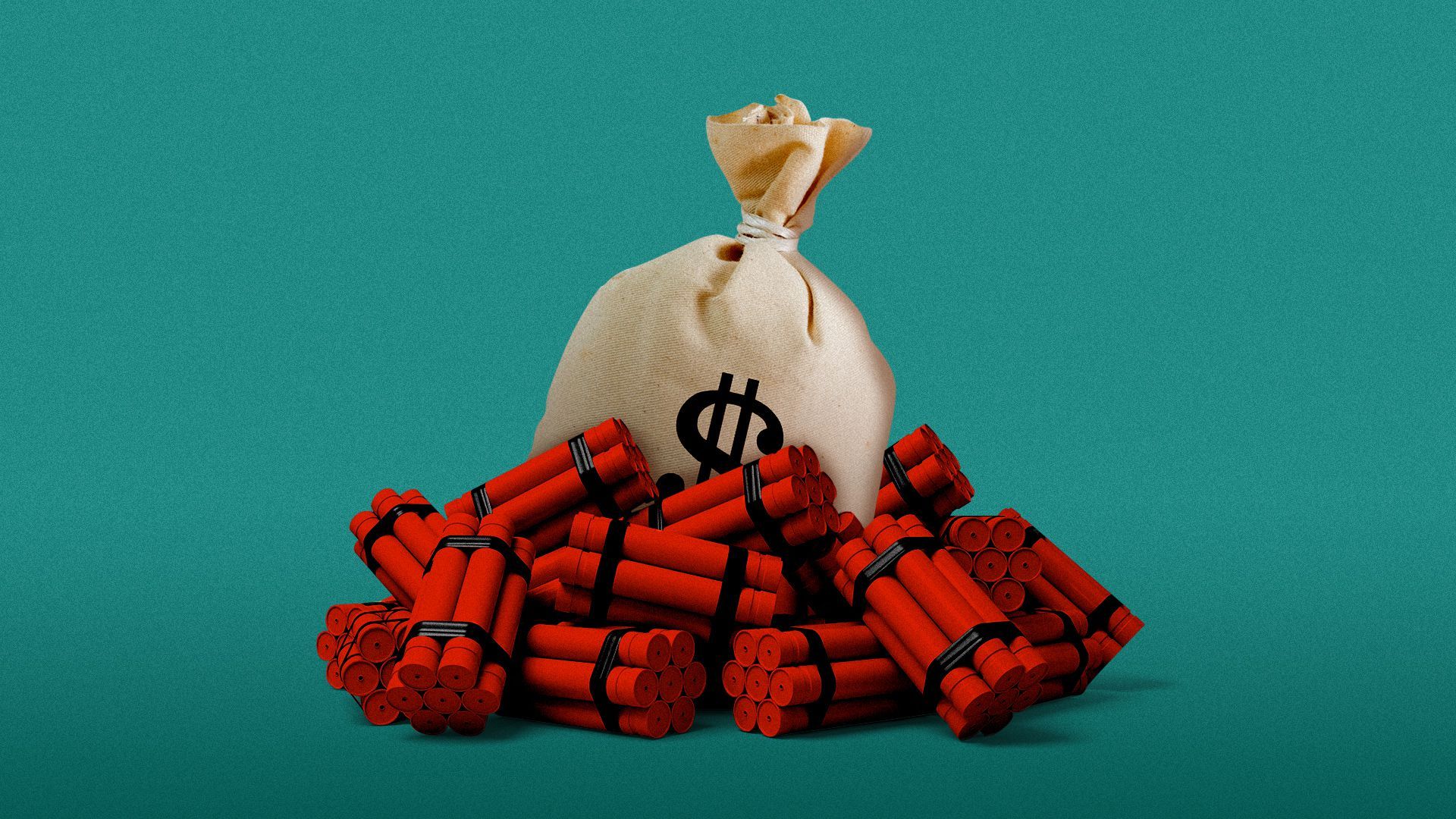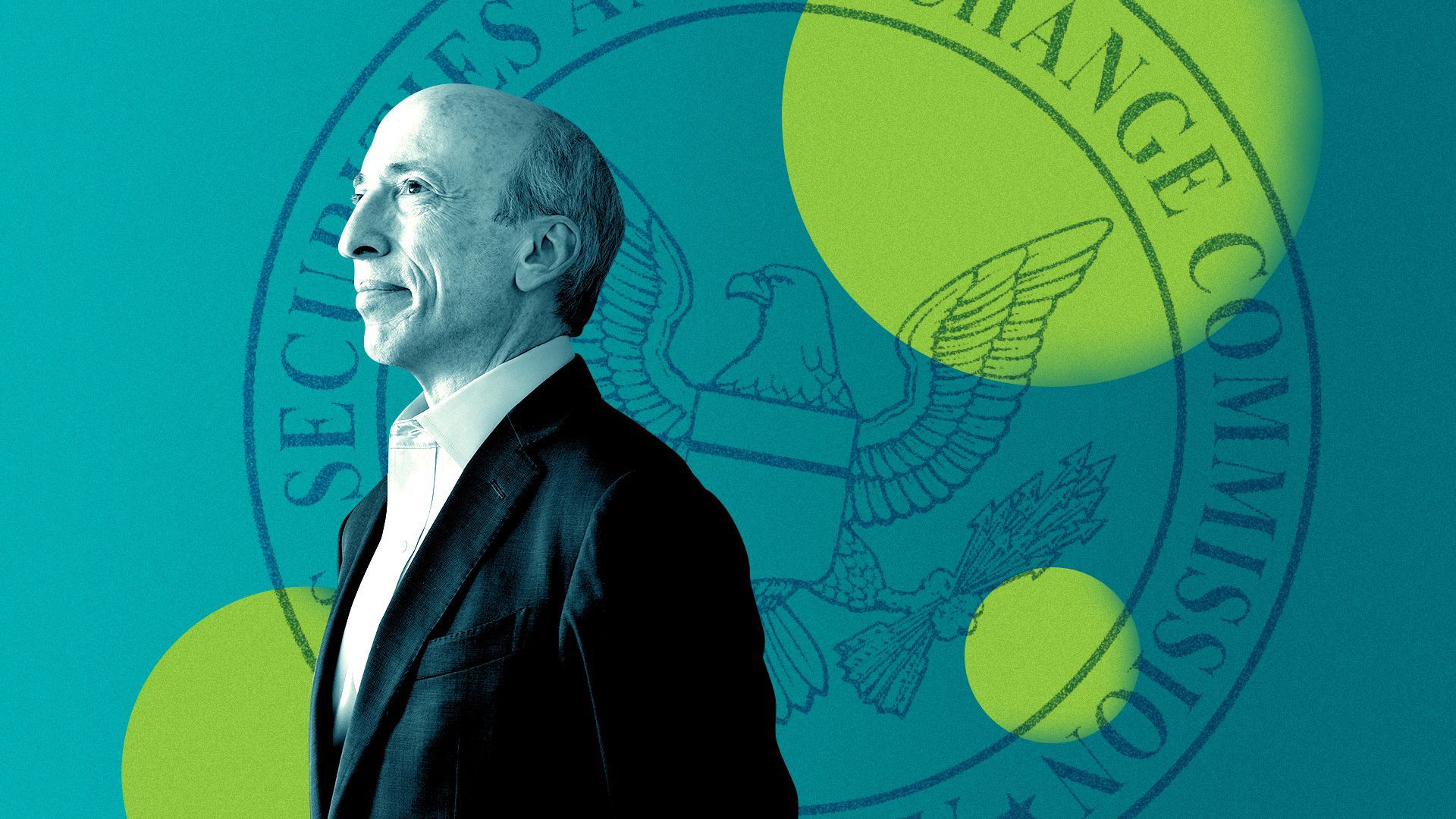| | | | | | | Presented By Northern Trust | | | | Axios Markets | | By Kate Marino ·Sep 02, 2021 | | 🌇 Good morning! Today's newsletter is 1,346 words, 5 minutes. 🍿What I'm watching: My '80s marathon continues. This time, "Beverly Hills Cop." Pure fun. Can't wait for whatever "Beverly Hills Cop II" and III have in store for me. No spoilers, please! ✉️Send tips and feedback to kate.marino@axios.com or hit me up on Twitter @thekatemarino. | | | | | | 1 big thing: Short at your own risk |  | | | Illustration: Aïda Amer/Axios | | | | The stock market's relentless upward momentum this year has lined the pockets of all kinds of investors, from veteran market players to Robinhood first-timers. - It's also made shorting stocks a lot more risky than it already was.
Why it matters: The meme stock phenomenon changed the game. After an initial upheaval that wiped out GameStop and AMC shorts in spectacular fashion, shorting stocks based on fundamentals has become a move that can turn lethal on a dime. - More broadly, it means going up against the historic amount of liquidity that's entered the equity market this year and the growth of a forceful "buy the dip" mentality.
- In a nutshell, buy the dip translates to cover the short.
Driving the news: The latest heavily shorted stock to catch the attention — and the money — of Reddit's WallStreetBets traders is Support.com. It nearly tripled during the back half of last week, though it's retreated from its Monday high. - Short interest in Support.com was about 27% as of Aug. 27, IHS Markit estimated, putting it in the top 10 most shorted equities.
 Data: S&P Capital IQ; Chart: Axios Visuals Catch up quick: Short-selling is a trade in which investors profit if a stock price declines. - Betting against a company sometimes gets criticism for being unpatriotic or immoral — but plenty of investors use it as a tool to hedge their positions or express views that companies are making poor decisions.
State of play: Investors with strong fundamental beliefs in a short position nowadays often don't maintain the trade nearly as long as they would have back in the good old days of 2019, one long/short hedge fund manager tells Axios. - "Even if fundamentally, being net short is where you want to be, you have to be very tactical and say 'okay fine I made some money on this short, I better take it off,'" he says.
One example: A few days into the multiday market selloff that kicked off in mid-August, "I covered a lot of stuff aggressively," he says. "[Long investors'] urge to buy that dip was so strong that you barely had a minute to cover." The bottom line: The dynamics appear to have chilled shorting activity. In February, 2.94% of the outstanding shares of S&P 500 constituent companies were held by short-sellers, S&P Global Market Intelligence noted at the time. - As of mid-August, that percentage was 2.24%, according to an S&P analysis provided to Axios.
|     | | | | | | 2. Catch up quick | | The SEC is investigating Workhorse Group, an electric delivery-truck maker that invested in Lordstown Motors — which is itself under federal investigations. (WSJ) A bankruptcy judge approved Purdue Pharma's reorganization plan, which will settle lawsuits filed by governments and opioid victims against it and its owners, the Sackler family. (WSJ) |     | | | | | | 3. The anti-porn conspiracy |  | | | Illustration: Aïda Amer/Axios | | | | If CEOs are increasingly acting as the fourth branch of government, then they certainly seem to have a moralistic streak, going much further than the law requires in terms of staying well away from porn, Axios Capital author Felix Salmon writes. Why it matters: Pornography and the production of sexually explicit material is entirely legal as far as the government is concerned — but it's also shunned by almost all of the business establishment. That makes a huge difference for its practitioners. Driving the news: OnlyFans has become one of the fastest-growing social networks in the world, with extremely impressive financials. Were it not in the porn business, it would be fighting off VCs desperate to invest at a multibillion-dollar valuation. - Instead, OnlyFans is struggling not only to raise funds but also to maintain healthy relations with the creators on its platform, who are deeply suspicious of the company after its badly explained and abortive attempt to ban porn on the site.
- OnlyFans CEO Tim Stokely, in an interview with the FT, initially said that the business "had no choice" but to ban porn, blaming banks in general and BNY Mellon in particular. But the move looks more like an ill-thought-through attempted pivot away from porn and toward a business model with lower costs and greater opportunities for VC-fueled growth.
How it works: Porn has always been a shady, marginalized industry, and has always attracted its share of criminals, including people involved in sex trafficking and revenge porn. Sites that make money from porn get targeted by anti-porn activists who get those sites blacklisted by banks and financiers worried about the reputational — and even legal — consequences of banking sites that might be showing underage or nonconsensual content. - State of play: Porn companies pay much higher fees and face much higher obstacles than most merchants to access basic payment services, and are banned entirely by many finance companies including Stripe and American Express. Porn performers, similarly, find it very difficult to open bank accounts.
The bottom line: It's common knowledge that any porn company will have major difficulties navigating the world of financial services. That knowledge has effectively prevented American entrepreneurs from being able to build a wholly legitimate alternative to the secretive foreign companies that currently dominate the space. Go deeper. |     | | | | | | A message from Northern Trust | | Market Currents podcast: Listen now | | |  | | | | Market Currents, a new podcast from The Northern Trust Institute, explores today's most hotly debated investment topics. Join host Katie Nixon as she interviews industry experts to investigate the evidence on both sides by separating facts, myths and theories. | | | | | | 4. The companies that benefit from Delta |  | | | A man gets tested for COVID-19. Photo: Joe Raedle/Getty Images | | | | The U.S. processed an average of 1.2 million COVID-19 tests daily in August — and some of the highest daily totals since April, Axios' Bob Herman writes. Why it matters: The surge of the Delta variant led to unexpected test volumes for diagnostic lab companies, and Wall Street is anticipating bigger profits for those companies as a result. What they're saying: Quest Diagnostics ran almost 100,000 standard COVID-19 tests every day in August. Labcorp only publishes updated test volumes quarterly now, but a spokesperson said the company is "seeing an increase in testing volumes primarily due to Delta and as students return to school." - Quest's daily volume is double what Wall Street analysts had predicted would be the norm by this time of the year, and Labcorp's volumes are very likely to be close to twice as high as expected.
The bottom line: Financial advisory firm Baird expects by year's end the additional tests will add $149 million of profit to Quest and an extra $96 million of profit to Labcorp. Go deeper. |     | | |  | | | | If you like this newsletter, your friends may, too! Refer your friends and get free Axios swag when they sign up. | | | | | | | | 5. Gary Gensler, agenda setter |  | | | Illustration: Aïda Amer/Axios | | | | Gary Gensler is the most important financial regulator in the world. He also presents a clear vision of what he wants to achieve, with no particular desire to set the financial world's worries at ease, Felix writes. Why it matters: Gensler refuses to negotiate against himself. The SEC chair's agenda takes a maximalist view of what the commission is interested in and should do, and then leaves all options visibly on the table. Wall Street knows, from his years running the CFTC, that he isn't bluffing. Where it stands: Out of the five main regulatory roles in government, two — the heads of the CFTC and the OCC — are unfilled, while a third — the Federal Reserve's vice chair for supervision — is held by a lame-duck Republican who will lose that office next month. That has given Gensler a clear headstart in terms of setting regulatory policy, alongside Rohit Chopra at the CFPB. What they're saying: "At the SEC, we're tasked with protecting investors, facilitating capital formation, and maintaining fair, orderly, and efficient markets," Gensler said in prepared remarks to the European Parliament Committee on Economic and Monetary Affairs on Thursday. - In recent interviews with Barron's and the FT, he has expanded on what that means: Potentially banning the practice of payment for order flow, which accounts for some 80% of Robinhood's revenues; and forcing substantially all of the crypto world's $2 trillion in assets to submit to regulatory supervision.
- "If it's going to have any relevance five and 10 years from now, it's going to be within a public policy framework," he said to the FT about crypto. "History just tells you, it doesn't last long outside."
The bottom line: If anybody involved in finance, from special purpose acquisition companies (SPACs) to decentralized finance (DeFi), was hoping to be able to cruise along on the basis of "this is how we've always done it," those hopes have been dashed by Gensler. If you want to maintain the status quo, you're going to have to persuade him that it's somehow optimal. |     | | | | | | A message from Northern Trust | | Trusts and sustainable investing: Building the bridge | | |  | | | | Sustainable investing is on the rise. But one category of investors remains on the sidelines: trustees of personal trusts. Learn how grantors, beneficiaries and trustees can bridge the gap between sustainable preferences and fiduciary duties. | | | | Thanks for reading! 😎 |  | | It'll help you deliver employee communications more effectively. | | | | | | Axios thanks our partners for supporting our newsletters. If you're interested in advertising, learn more here.
Sponsorship has no influence on editorial content. Axios, 3100 Clarendon Blvd, Suite 1300, Arlington VA 22201 | | | You received this email because you signed up for newsletters from Axios.
Change your preferences or unsubscribe here. | | | Was this email forwarded to you?
Sign up now to get Axios in your inbox. | | | | Follow Axios on social media:    | | | | | |













No comments:
Post a Comment